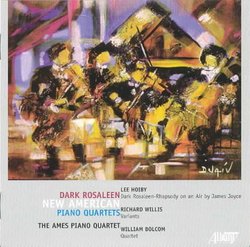Album DescriptionLee Hoiby writes about this recording: "The Ames Quartet worked closely with me on the development of Dark Rosaleen, collaborators from the word go, and continually bless it with loving insights and efforts. Together we have explored some evocative remnants of James Joyce c. 1900; Mangon, the deranged Dublin litterateur of the 1830s; and the dolefully passionate Hibernian ethos. As I myself am a Midwesterner who has chosen to express himself musically in a classic European vocabulary, it is gratifying to hear the Ames players of Iowa display their great reservoirs of nuance and schwung and historical imagination. They are simply superb musicians and I warmly thank them." William Bolcom writes about the performance of his work: "Your performance is the most emotionally intense I have heard?you sustain the emotional curve extremely well?the slow tempo (of the last movement) pays off at the end - really frightening! I don't compose quite as I did 30 years ago, but the feeling of the piece seems so present right now. Where we are today had its roots in that time. The Intermezzo seems particularly sad to hear at this moment, and you have played it with much personality." Richard Willis' Variants, commissioned in 1990 by Quadriga (a piano quartet then in residence at Texas Tech University), follows similar principles to Hoiby's Dark Rosaleen. It, too, is a set of variations built upon a melody presented first by the viola, in which an internal interval (this time a minor second heard in the first two pitches), serves as the principal unifying element of the composition. Both begin with a haunting quality and then present the motive in a variety of guises ranging from virtuoso to angular to jazzy to lyric, highlighting the late 20th century composer's dual interests in maintaining a tightly controlled form based upon restricted motivic material, while still exploring a wide range of moods.


 Track Listings (3) - Disc #1
Track Listings (3) - Disc #1